

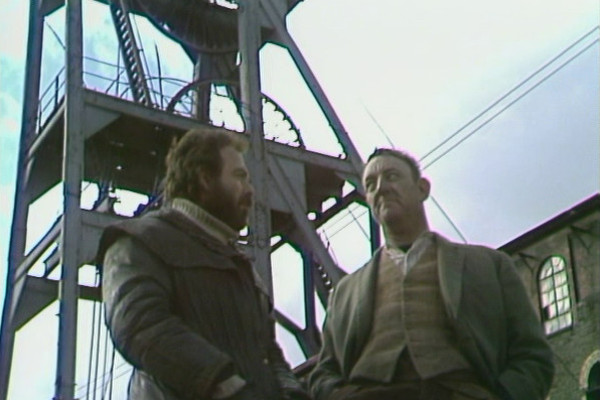
One of the great "so bad it borders on genius" episodes of Survivors. The gang discover a former mining settlement in northern England, so naturally their culture is based around one big hotel pub. The episode stops short of characters feeding black puddings to whippets while saying "ecky thump", but only just.
Peculiar scenes include Charles trying to prostitute Jenny, and casual racism like Jenny calling him a "Welsh bastard" in return, and Charles referring to Alec Campbell as "McSporran". The episode is littered with people telling each other their presumed motivations in massive chunks, and introduces Robert Gillespie's misjudged "ex junkie" character. It's terrible stuff, yet brilliant with it.
Such thoughts were actually echoed by Denis Lill himself in an interview for The Making of Terry Nation's Survivors, with him claiming: "There was another bizarre episode we filmed with Bryan Pringle. We found this curious sort of north-country pub or club. That was a really odd episode. Lucy's character actually called me a Welsh bastard! We even had committee meetings about that line. I didn't care what I was called as long as I was called Welsh."
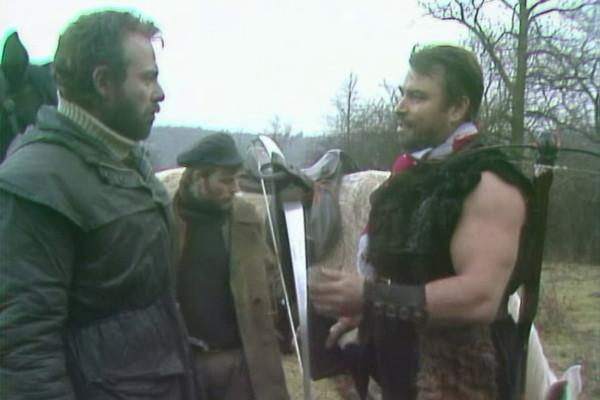
Law of the Jungle is a decent enough episode, and has in fact ranked three places higher than originally intended on a rewatch. The problem is that so much of its conflicts feel artificially contrived, and without coherence to what has gone before.
With the group taken in by Brian Blessed's bullying Brod (apologies for the abjectly awkward alliteration) then we're led to believe they can't leave lest they be savaged by wild dog packs that are roaming the country unchecked. But while wild dog packs are a problem, they're not quite the epidemic this episode suggests, at least going by many of the other episodes in this run.
Not only that, but while Blessed is still the version that acted rather than bellowed - to a point, at least - the character of Brod is pretty two-dimensional, and it's somewhat cartoonish seeing the gang at the behest of a fully grown school bully. Yet the rougher edges of the script and the somewhat unlikely motivations of the characters do get less jarring on repeat viewings.
Yet while it may not quite come over as real onscreen, there was very much genuine drama while filming - John Abineri later confessed that he'd got so into his role as Hubert that if he'd been asked to fire his crossbow at Blessed for real, he'd have done so. One last point is that Wikipedia carries uncited claims that there were only two cameras being used at this stage, and one was completed knackered - something that would seem to be backed up by many of the shots having tram lines down the left, or, as above, green halos over peoples' heads.

A reasonable episode where John's mother is found, this does mean that it falls upon the shoulders of Stephen Dudley as John to carry its emotional weight. Actually quite sweet, but with his powers to look into the camera undimmed, Dudley, bless him, undermines any drama, but in a lovable, adorable way.
One huge success of the third series is that the wild dogs that are now roaming the country actually look like wild dogs. While the first series is clearly Survivors at its peak, it's hard to forget Starvation, where the most docile-looking "dog pack" in the world is showcased. For the third series they'd got genuinely hostile Scouser dogs from a security firm that were trained to attack.
In the audio commentary for Law of the Jungle with Lucy Fleming and director Peter Jefferies, Jefferies even admitted the animal welfare-troubling fact that production unit manager Michael Bartley was responsible for making sure the dogs hadn't been fed for 24 hours before shooting. This is one element that doesn't quite come off in this episode, as while the Alsatian that goes after Jenny does look suitably savage, its wagging tail is in shot.
One curious element of this third series it that the useful commodity of bricklayers are mentioned in a couple of episodes, including this one. We discover in Power that the combined populace of England and Scotland (Wales not mentioned) is around 160,000 people, only around 10,000 of which are living in England. As the plague caused no property devastation, and appears to have died out by this time, why would new homes need to be built? There must be hundreds of thousands of uninhabited properties, yet in a world-building series that's gone three years without saying how anyone gets to go to the toilet, we instead get this illogical plot point.
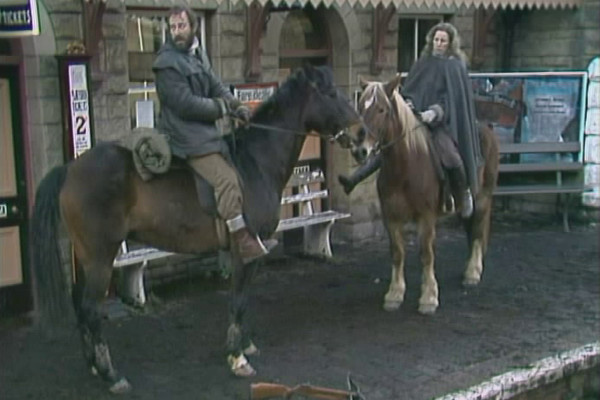
A reasonable change of pace with the Survivors taking more of a downtime. It's refreshing as it's a bit more relaxed, but in a way that has intrigue, with the group trying to build communities again. It is hindered by some jarring exposition, including a massive info dump at the end, but it contains enough quality to make third place. As previously stated in this article, only the top two entries are real standouts, but this one is decent enough.
One sad failing of The Anorak Zone has been a quest to find out the full ratings for Survivors. Two unofficial books were printed on the series, which may have contained the information, but they're both sadly out of print. The Stage gave something of an indication, for the first series at least, stating that the June 1975 figures (so series one, episodes 7-10) averaged "more than 7 1/2 million." The same publication also gave the July 1975 figures (series one, episodes 11-13) as averaging "nearly 8 million".
Such figures were quoted from the BBC's own declared figures, which measured individual viewers, where more commonly reported was the JICTAR system of ITV, which measured homes, rather than people. So while, for JICTAR, programmes could enter the Top 20 in July 1975 with just 5.25m, in terms of actual viewers, that could be the equivalent of over 11 million individuals. Which would explain why the same report in The Stage (10th July 1975) also cited The Brothers as getting over 10.5 million, despite it not appearing in the Top 20. Unsubstantiated claims suggest that the figures were possibly consistent throughout, which would make Survivors not a hit, but also not a flop, either.
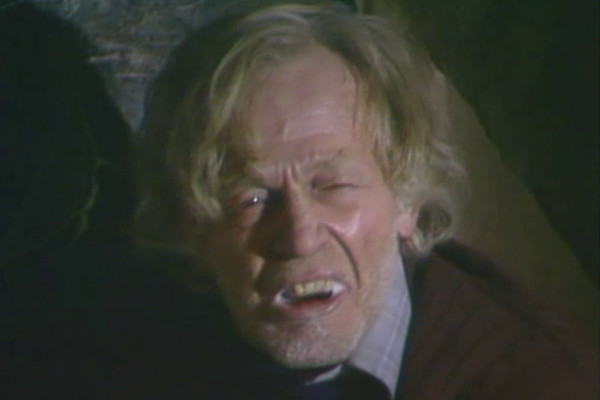
For the DVD releases of Survivors, five commentary tracks were recorded, as well as a "making of" for the final series, and various interviews, etc. Unfortunately these were only included on the individual series boxsets, not on the cheaper complete boxset. While an earlier article for series two stated that it was too expensive to consider, it seems wrong to complete a look at Survivors and not feature them. So yes, in the name of full research, the savings account took a hit.
Series one saw Carolyn Seymour and director Pennant Roberts record a commentary for the very first episode, while Law and Order had one from Ian McCulloch and Lucy Fleming. Series two only has one commentary track, though it's arguably the most informative, as Denis Lill and Pennant Roberts talk through Lights of London: Part 2. Some of the information there includes Vivienne Burgess having a small role that had to be cut for timing issues, and that as a result she was reused later in the series.
Which brings us up to series three. Law of the Jungle has Lucy Fleming and director Peter Jefferies talk about the production, including the revelation that Brian Blessed slapped her for real in the part. Mad Dog gets guest star Morris Perry and director Tristan de Vere Cole giving their thoughts.
While arguably very few, if any, commentary tracks can be regarded as "essential", it's certainly worth listening to for those interested in the series, as both give insights into the production, including the fact that another guest star, Bernard Kay, had suffered the loss of his wife just a day before he was due to arrive for the shoot, and insisted on taking part to take his mind off it. There's also discussion of scenes being added to ensure the episode didn't underrun, as the BBC insisted on extensive cuts to the rabies scenes, as they were regarded as being too disturbing.
Both of the series three commentaries also give the perhaps shocking admissions about treatment of animals, practises which would be extremely unlikely to be allowed today. Events included starving some of them for the right "look", and, here, the "shot dogs" were live ones given injections to make them unconscious. All the commentaries have a moderator who generally tend to keep it moving without being too intrusive, and in Mad Dog, Tristan de Vere Cole admits that he never watched the show when he wasn't making it, and tried to make the character of Agnes harder in Long Live The King, later realising it might have not been consistent with episodes he wasn't involved in.
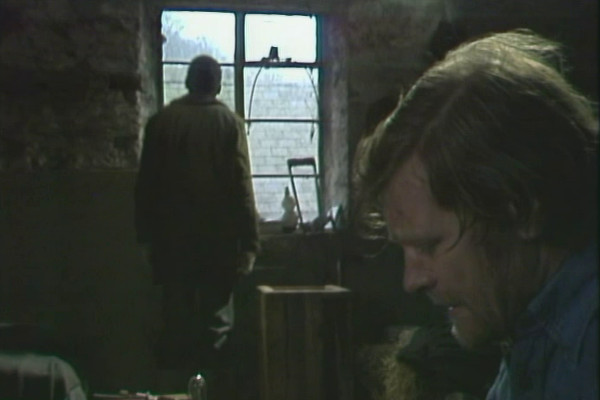
A brilliantly brutal, fatalistic episode of Survivors. It's here that Greg learns that his plans to link up with Norway have resulted in the spreading of a new form of infection. Rather than help to restore a new society, all he's managed to do is not only possibly end one, but also, in a fantastically ironic twist, brought about his own death after he contracts the disease.
McCulloch's decision to leave at the end of the second series and only return in two episodes that he'd written himself may seem something of a fit of pique, but he claimed to bear no personal ill-will towards Denis Lill (the main reason for his leaving) and admired his work in future projects. Interviewed for The Making of Terry Nation's Survivors, McCulloch stated: "From a purely selfish point of view I wasn't happy sharing the male lead with Denis Lill. It had nothing to do with Denis himself, it was just that I felt that I had built something which was then being taken away. For example, Don Shaw wrote the third series episode Mad Dog for Greg and Terry Dudley gave the episode to Charles. As it was one of the best episodes of the entire series I wasn't best pleased."
McCulloch did propose a fourth series to Terence Dudley, an idea where Greg was still alive, and an African nation who weren't affected by the plague came to England to colonise it. Such satirical musings on the nature of enslavement didn't go down too well with the BBC, and, though intriguing, may have been best left alone, especially considering McCulloch's hit-and-miss rate as a writer. Sometimes it's easy to look at episodes A Friend in Need and A Little Learning and believe that McCulloch didn't really understand the true direction of Survivors... but then put on The Last Laugh, and realise that, given the chance, he knew exactly what he was doing.